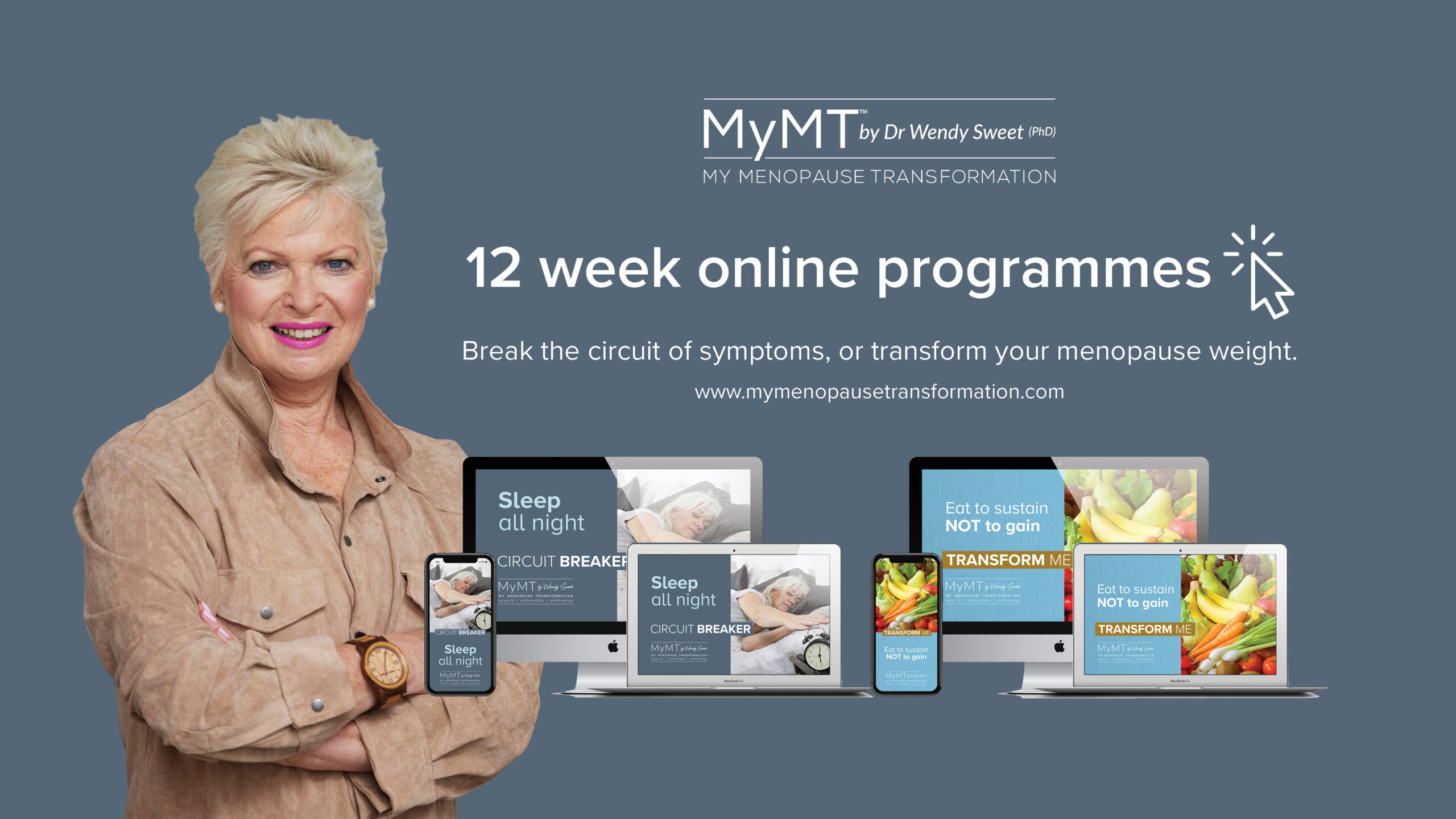“The social, cultural, anthropological and personal effects of chronic fatigue are enormous on human economy and this condition is poorly understood.” [Bjorklund, Dara et al, 2019].
Over the past few decades, scientists have been doing a great job unlocking the secrets of ageing. Not only are they discovering how our body breaks down but also how to better manage our health so that we improve our health-span. In general, women outlive men when it comes to longevity research, but I can’t emphasise enough, that our menopause transition matters to how well we age.
Fatigue is a known symptom during menopause and it can be the slippery slope towards a clinical condition known as Chronic Fatigue Syndrome (CFS), and yes, if you have this, then you need a proper diagnosis and medical support.
CFS is a distinctive syndrome characterised by prolonged fatigue in combination with other factors such as, muscle and joint pain, headaches, tender lymph nodes, recurrent sore throat and significant problems with cognition, concentration, memory and sleep as well as a deterioration after physical activity. (Bjorkland et al, 2019).
As I read the list of symptoms of chronic fatigue syndrome, it’s not lost on me that these are also symptoms of menopause – and a body not coping with the changes that beset us as we move through this life-stage.
The exhaustion that women feel during peri-menopause and menopause may not be diagnosed as chronic fatigue syndrome obviously, but it is a reality for many.
Thousands of women who have come into my coaching community complain about their fatigue – not only from not sleeping all night, and post-viral fatigue from Covid-19, but the ‘crash-on-couch-at-night’ fatigue that arrives from busy days not knowing how to look after themselves as they move through menopause.
Coupled with brain-fog and depression, it’s hard for them to focus on all that needs to get done in their day. As such, they turn to what I call the quick-fix energy-grabbing ‘C.A.T.S.‘ – Caffeine, Alcohol, Tobacco and Sugars – in order to cope.
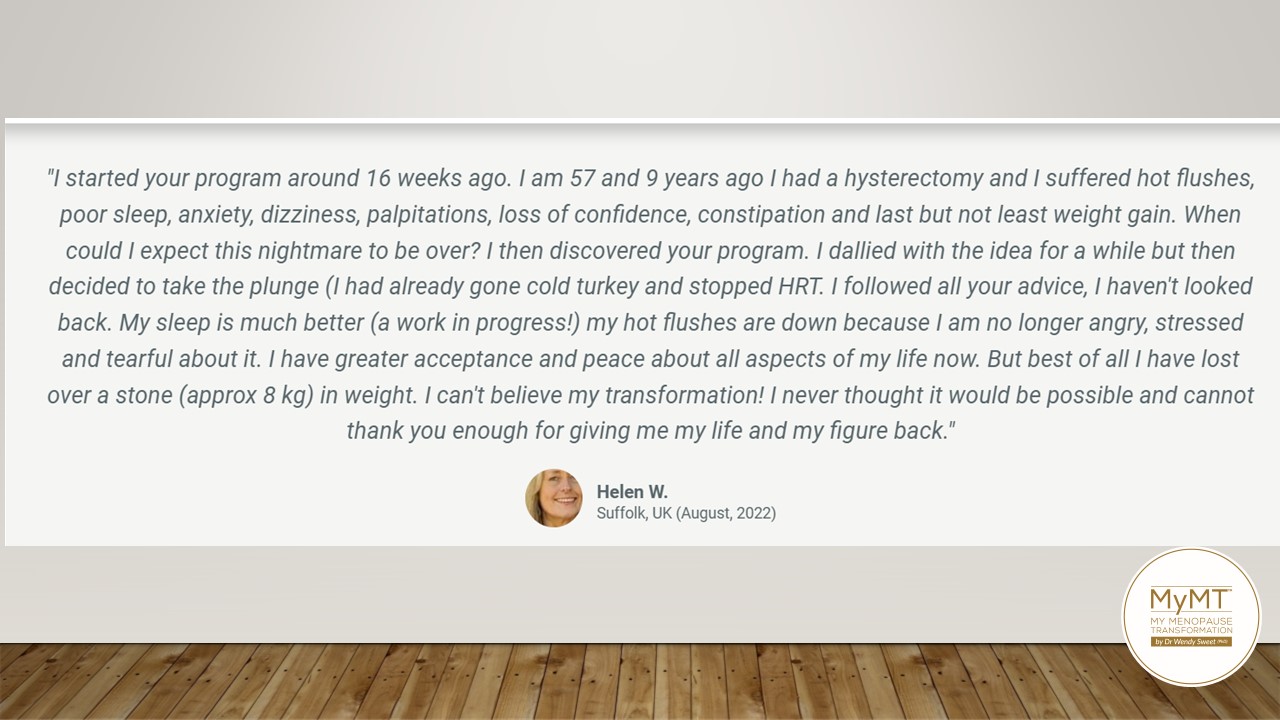
It’s often said that vitamins are ‘vital to life’ and when it comes to our nutritional needs in mid-life, that’s a statement I want you to remember, especially when it comes to Vitamin B12.
Whilst all vitamins are indeed ‘vital for life’, if you are experiencing worsening fatigue, hot flushes, dizziness, tingling and numbness, a sore tongue, concentration or visual disturbances, then don’t put them in the “oh, it’s just menopause compartment”, go to your Doctor and get your B12, folate, iron and ferritin (stored iron) tested.
You may well be deficient in Vitamin B12 or any of these nutrients that your body needs.
All of these nutrients are utilised in energy-production, nervous system conduction and in supporting brain health. Without enough Vitamin B12, you can feel tired, weak and lethargic. Furthermore, low B12 may cause worsening hot flushes and night sweats as your heart works harder to move oxygen around your body.
Without enough B12 absorption, your red blood cells don’t divide normally and can’t carry out their job of delivering enough oxygen to tissues and cells to help you with your energy levels. As such you may be anaemic.
If you have liver health problems, gut health concerns or IBS, then this can affect your B12 absorption as well. It’s why I have modules on all of these concerns and how to rectify them in the MyMT™ programmes.
In Greek, the word ‘anaemia’ means “no blood”. But that’s a bit of an exaggeration. You have plenty of blood whether you are anaemic or not. However, whether you are in peri- or post-menopause, how well you are making blood cells is key to your successful, symptom-free menopause journey.
And to make beautiful blood cells, you need a body that is absorbing Vitamin B12 (known as Cobalamin).
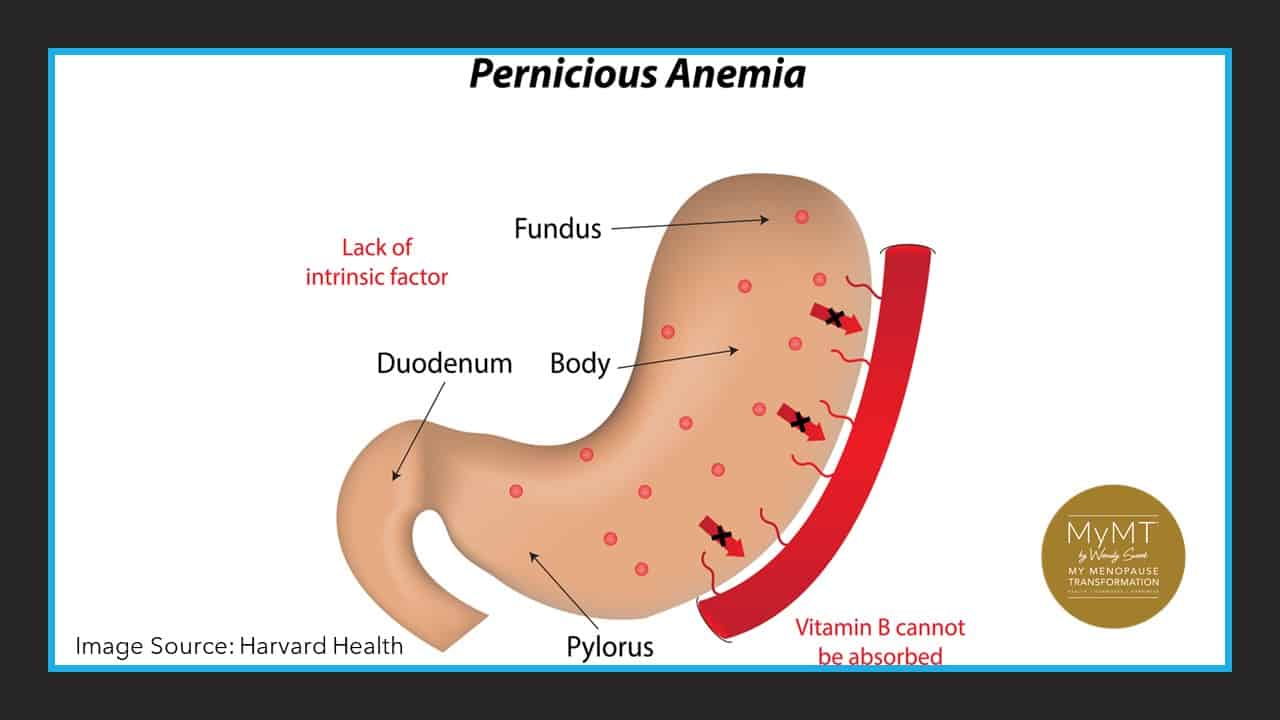
The discovery of Vitamin B12 was worthy of two separate Nobel prizes. The valuable contribution of clinical reports and studies of patients with a condition called ‘Pernicious Anaemia’ throughout the 19th Century, resulted in the discovery of this vital vitamin.
Pernicious anaemia is caused by an auto-immune condition, or digestive problems or from not getting enough Vitamin B12 in the diet and/or not being able to absorb this properly.
If you are vegan or vegetarian and you are a regular exerciser, then please make a note to monitor your B12 levels every few months. If you are a heavy drinker, then do the same.
Alcohol consumption is known to affect your absorption of Vitamin B12.
Although there are numerous reasons for Vitamin B12 deficiency, relatively new research conducted on women during their menopause transition, shows that malabsorption of Vitamin B12 is mainly caused by:
- digestive disorders,
- an inadequate intake from foods, and,
- the taking of medications which interfere with absorption. [ Milart et al, 2018].
If you develop Vitamin B12 deficiency and then go on to develop Pernicious Anaemia, then this is an indication that a stomach protein called Intrinsic Factor may be insufficient. You see, you need this Intrinsic Factor to enable your body to absorb Vitamin B12 from your diet.
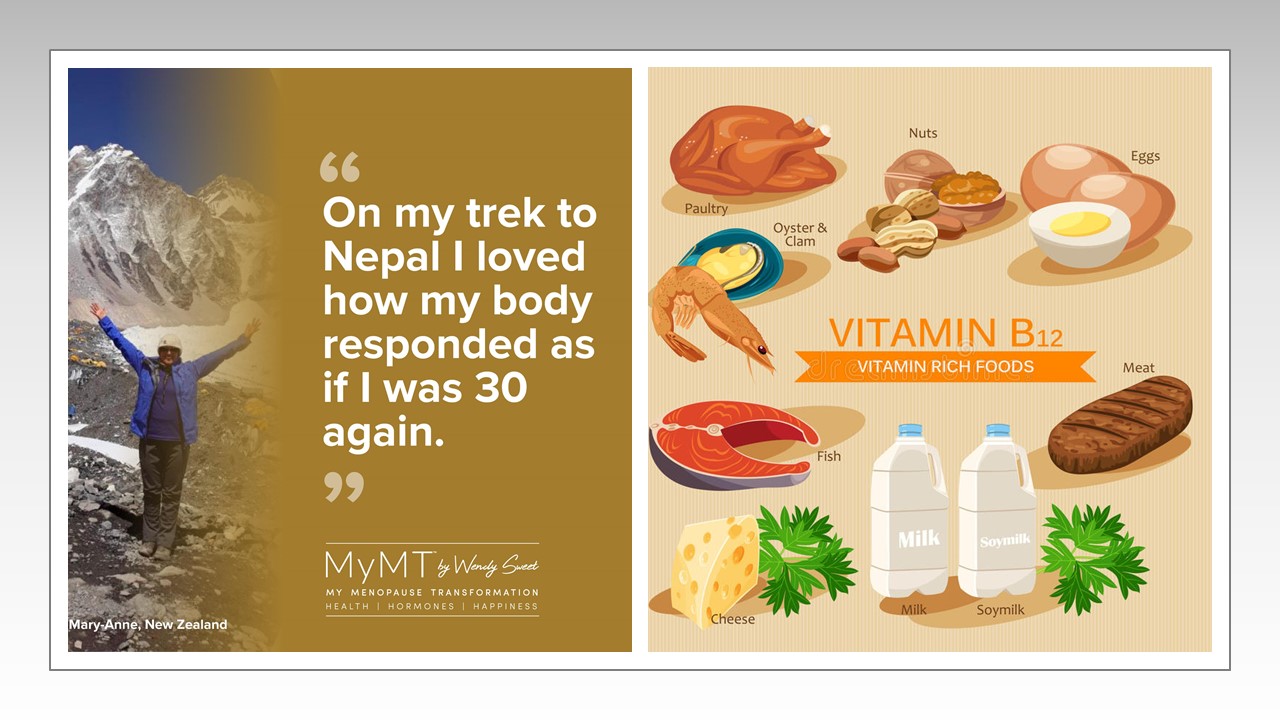
How do I get enough Vitamin B12 from my diet?
Most people absorb Vitamin B12 from animal foods including fish, eggs, poultry, dairy and meat. However, as I often get women onto a plant-based diet to help to reduce inflammation as they age, then other foods become important too. These include liver, mackerel and herring.
For those of you who are vegan or vegetarian, then Vitamin B12 is not usually present in plant foods but many healthy breakfast cereals are fortified (added to) with Vitamin B12 which, for vegetarians, is readily absorbed.
There are some soy, rice, and nut milks that have B12 added too. These are a readily available source of B12 for vegans and those who eat minimal animal products. Supplementation may be something to consider after you get your blood levels tested.
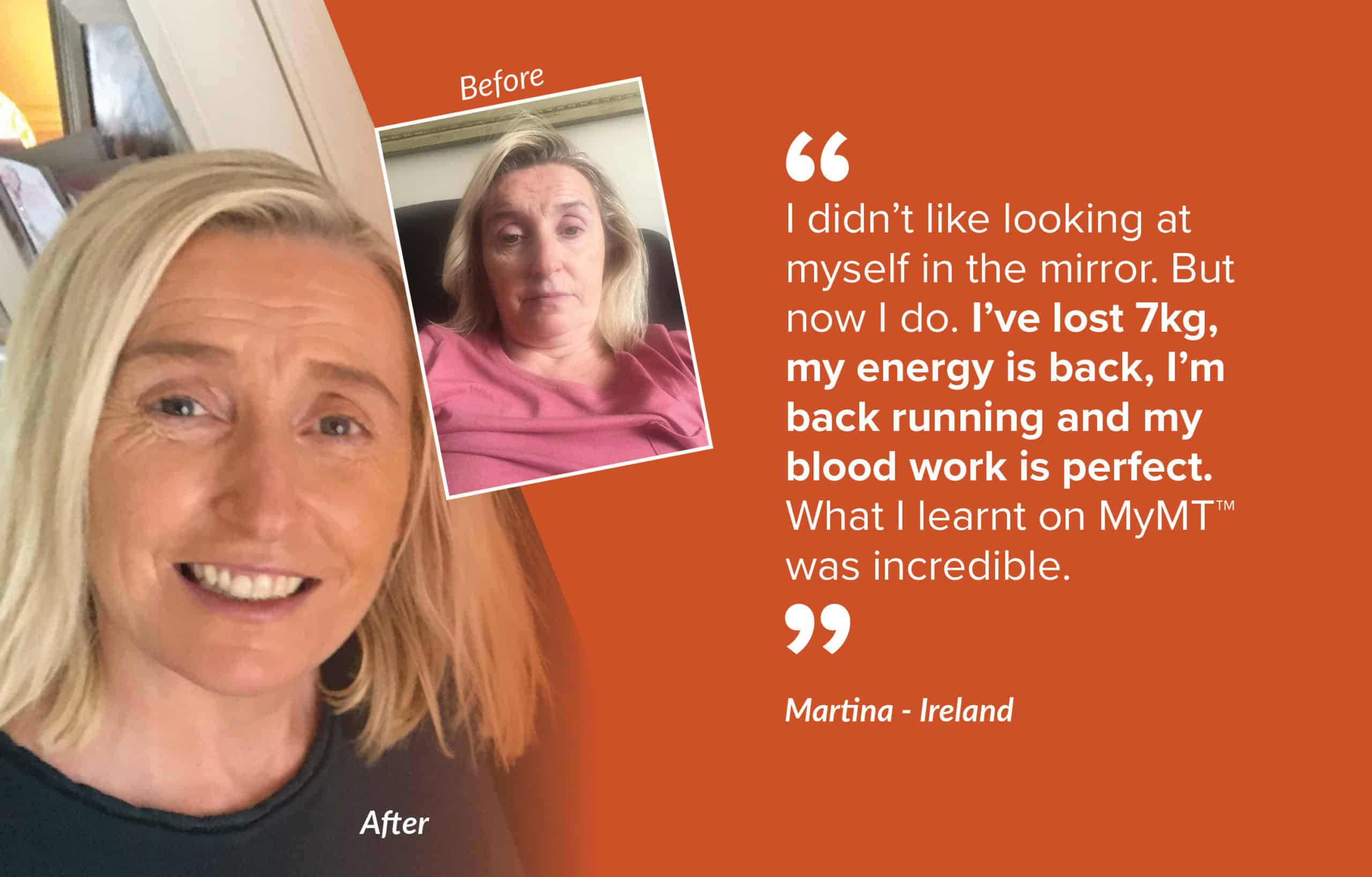
Whilst all of the B-vitamins are vital to us as we age, the B-group of vitamins need to be taken seriously by busy, active women going through their menopause transition. When oestrogen levels decline, our immune system is affected too.
Women have a higher incidence and prevalence of autoimmune diseases than men, and 85% or more patients of multiple autoimmune diseases are female [Desi & Brinton, 2019]. This may be because women undergo important endocrinological changes at least twice during their lifetime, puberty and menopause, with many women undergoing an additional transition: pregnancy.
All these stages of hormonal havoc, leave women vulnerable to immune system disorders and changing health as we age.
That’s the purpose of My Menopause Transformation – to take the guess-work out of this stage of life. Whether you are just starting out, or you are throuogh menopause and still struggling with your energy levels, I hope you can join me for my scientifically evidenced-based 12 week programme. It might just change your life too.
Dr Wendy Sweet (PhD), Founder of MyMT™/ Member: Australasian Society of Lifestyle Medicine.
References:
Batista KS, Cintra VM, Lucena PAF, Manhães-de-Castro R, Toscano AE, Costa LP, Queiroz MEBS, de Andrade SM, Guzman-Quevedo O, Aquino JS. The role of vitamin B12 in viral infections: a comprehensive review of its relationship with the muscle-gut-brain axis and implications for SARS-CoV-2 infection. Nutr Rev. 2022 Feb 10;80(3):561-578.
Bjørklund G, Dadar M, Pen JJ, Chirumbolo S, Aaseth J. (2019). Chronic fatigue syndrome (CFS): Suggestions for a nutritional treatment in the therapeutic approach. Biomed Pharmacother. 2019 Jan;109:1000-1007. doi: 10.1016/j.biopha.2018.10.076. Epub 2018 Nov 5. PMID: 30551349.
Cocker, J. P. (2016). Vitamin B12: A secondary analysis of status, biomarkers and other determinants in young and elderly women. (Thesis, Master of Dietetics). University of Otago. Retrieved from http://hdl.handle.net/10523/6297
Desai, M. K., & Brinton, R. D. (2019). Autoimmune Disease in Women: Endocrine Transition and Risk Across the Lifespan. Frontiers in endocrinology, 10, 265. https://doi.org/10.3389/fendo.2019.00265
Health Navigator, New Zealand. Healthy Living Series, Vitamin B12
Milart, P., Woźniakowska, E., & Wrona, W. (2018). Selected vitamins and quality of life in menopausal women. Przeglad menopauzalny = Menopause review, 17(4), 175–179.
Taylor-Swanson L, Wong AE, Pincus D, Butner JE, Hahn-Holbrook J, Koithan M, Wann K, Woods NF. The dynamics of stress and fatigue across menopause: attractors, coupling, and resilience. Menopause. 2018 Apr;25(4):380-390

